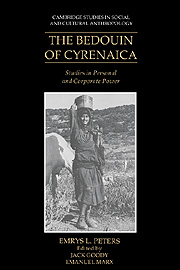Book contents
- Frontmatter
- Contents
- List of illustrations
- Foreword by Jack Goody
- Preface
- Introduction by Emanuel Marx
- 1 The Sanusi order and the Bedouin
- 2 The Bedouin way of life
- 3 The tied and the free
- 4 Aspects of the feud
- 5 Proliferation of segments
- 6 The power of shaikhs
- 7 Debt relationships
- 8 Family and marriage
- 9 Bridewealth
- 10 The status of women
- Notes
- Bibliography
- Index
- Cambridge Studies in Social and Cultural Anthropology
- Plate section
3 - The tied and the free
Published online by Cambridge University Press: 02 December 2009
- Frontmatter
- Contents
- List of illustrations
- Foreword by Jack Goody
- Preface
- Introduction by Emanuel Marx
- 1 The Sanusi order and the Bedouin
- 2 The Bedouin way of life
- 3 The tied and the free
- 4 Aspects of the feud
- 5 Proliferation of segments
- 6 The power of shaikhs
- 7 Debt relationships
- 8 Family and marriage
- 9 Bridewealth
- 10 The status of women
- Notes
- Bibliography
- Index
- Cambridge Studies in Social and Cultural Anthropology
- Plate section
Summary
Several types of formal status relationships occur among the Bedouin, and some aspects of the relationships are common to all. Part of the purpose of this discussion is to characterise one of these types, so that it can be identified and distinguished from the others; it is found between tribesmen who are known as the Marabtin (literally, ‘the tied’) and those who are referred to as the Hurr (literally, ‘the free or noble’). Inevitably, in a reconnaissance of a wide field of relationships of this sort, a crop of problems appears, for, although a statement of the rules excluding the tied or clients from noble or patron status is simple enough, their relationships are not confined to a few specific sets of social situations, but enter into many, and significantly affect problems related to them. The relationships between patron and client do not constitute a single problem; they are cultural terms in which a bundle of various relationships are packaged, the separate parts of which are significant or unimportant not in isolation but in the context of particular problems. Since this is intended as a general account, only some of the problems involved can be raised. The choice of problems is admittedly somewhat arbitrary, and it is guided mainly by the desire to give the relationship distinctiveness, as well as by a personal interest in Bedouin power politics.
The terms Hurr and Marabtin are heard throughout the country, but the general social context differs so markedly between the sheep and camel herders of the more southern and western areas and the almost sedentary cow and goat herders of the north central plateau area that it would be quite erroneous to treat them together.
- Type
- Chapter
- Information
- The Bedouin of CyrenaicaStudies in Personal and Corporate Power, pp. 40 - 58Publisher: Cambridge University PressPrint publication year: 1991



